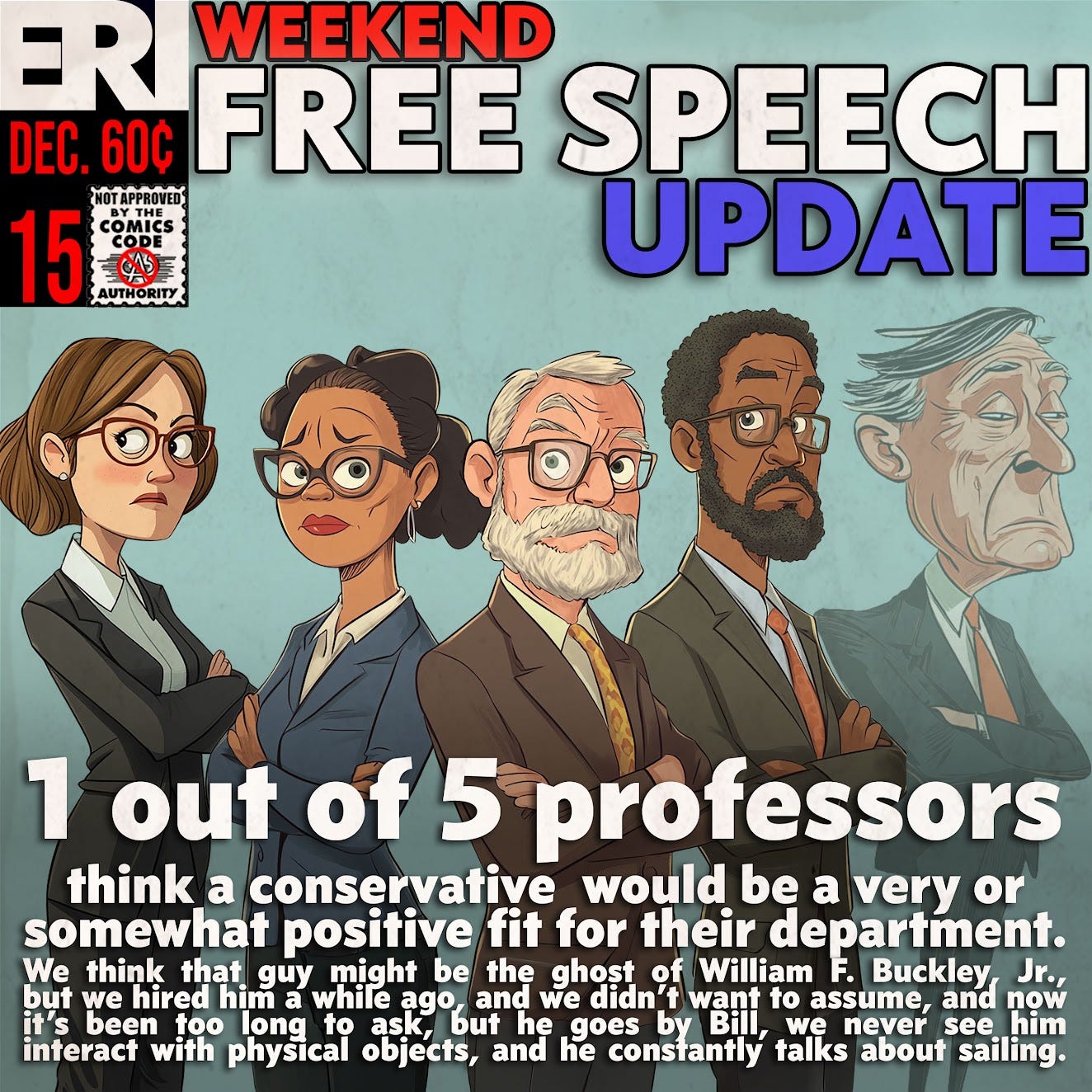Grim picture for faculty free speech, Matt Ridley’s ‘Evolution of Everything’ FTW, & lots o’ KOSA!
Bringing you the latest free speech news (12/15/24)
Story of the week
FIRE SURVEY: Only 20% of university faculty say a conservative would fit in well in their department
FIRE surveyed 6,269 faculty members at 55 major colleges and universities over a three-month period for “Silence in the Classroom: The 2024 FIRE Faculty Survey Report,” and discovered a fraught campus atmosphere in which wide swaths of those surveyed admitted to hiding their political views to avoid censure.
This week in FIRE’s blog
Four big reasons you should oppose KOSA by Carolyn Iodice & Greg Gonzalez
KOSA’s supporters believe that focusing the duty of care on “design features” solves the bill’s First Amendment issues, but in reality it only masks them. The term “design features” is broadly defined to include any feature of the platform that would cause minors to spend time on it. But pretty much all of the features of social media platforms are designed for creating and sharing content and talking to other users — all activities that teens (and adults!) like to spend time on, and all squarely protected by the First Amendment.
Norwich University student journalists stand up for a free, independent press by William Harris
Texas legislators file unconstitutional bills to prohibit use of AI in election campaigns by John Coleman
FIRE’s statement on X’s support of misguided ‘Kids Online Safety Act’
This week in ERI
I’m aware of the data correlating social media use and harm to minors, and I’m far from indifferent to those harms, especially as my boys start to reach the ages where social expectations will include the use of these platforms. But constitutional law cautions us that, where the right to free expression is implicated, we should use the least restrictive means to achieve our goals. It also cautions us that the deprivation of a civil right is always harmful. We have so much more we can try before we resort to something like KOSA, starting with banning phones in schools.
This week on ‘So to Speak’
This week on So to Speak, Nico Perrino sat down with Yale law professor and FIRE board member Keith Whittington to discuss his new book, “You Can’t Teach That!: The Battle over University Classrooms,” the history of academic freedom, and more.
International free speech stories of the week
New Zealand official reverses visa refusal for US conservative influencer Candace Owens (AP) by Charlotte Graham-McLay
Raygun musical cancelled after viral Olympian's legal threat (BBC) by Emma Rossiter
In a statement to the Guardian, Gunn's legal and management team said it was committed to protecting her intellectual property and ensuring that her brand remained strong and respected.
London Calling: Ronnie’s First Amendment Roundup
The U.S. Court of Appeals for the Second Circuit revived two lawyers’ constitutional challenges to a Connecticut legal ethics rule that prohibits a lawyer from doing anything he or she “knows or reasonably should know is harassment or discrimination on the basis of race, color, ancestry, sex, pregnancy, religion, national origin, ethnicity, disability, status as a veteran, age, sexual orientation, gender identity, gender expression or marital status,” with “harassment” defined to “include severe or pervasive derogatory or demeaning verbal … conduct.” Violators face sanctions up to loss of license, and any person who believes a Connecticut attorney has violated the rule can complain to the state bar. Mario Cerame and Timothy Moynahan are Connecticut lawyers who regularly speak on issues including free exercise of religion and critical race theory in manners they allege implicate the rule, and in ways those with opposing views could construe “as personally derogatory or demeaning.” The trial court dismissed their case for a perceived failure to claim they engaged or will engage in speech that is discrimination or harassment under the rule, and thus were not chilled by it, especially given its lack of enforcement history and that it makes speech the First Amendment protects a non-violation. The Second Circuit reversed, holding the lower court “failed to credit [their] well-pleaded allegations regarding the speech in which they wish to engage and erroneously assessed not whether such speech is arguably proscribed but whether it is in fact proscribed,” while also placing “undue emphasis” on both lack the enforcement history of the new rule and its First Amendment carve-out. It also held Cerame and Moynahan’s “desire to engage in speech on controversial issues in legal blogs and articles, at CLE events, and in press releases, public speeches, and other contexts clearly involves a course of conduct affected with a First Amendment interest” that the rule may reach. The case now returns to the trial court. (Full disclosure: Mario Cerame is a member of the First Amendment Lawyers Association, where Ronnie sits on the Board and Greg is also a member.)
Book of the month
My book of the month for December is Matt Ridley's excellent, ‘The Evolution of Everything: How New Ideas Emerge.’ It's an explanation of how, despite what Nassim Taleb calls the Soviet-Harvard Delusion, most progress and innovation is actually a bottom-up, not top-down process. He explains how this works in everything from money to education, science to culture, morality and philosophy to business and religion, and more.
The book also finally got me to understand why junk DNA isn’t just a peculiarity of our biology, but a necessary and predictable result of the bottom-up process of evolution. And it took on free will in a way that was more nuanced and balanced than I'm used to seeing in recent books.
But it really got me thinking about the peculiarity of America's semi-libertarian ethos. (I say semi-libertarian because a lot of us, both on the right and the left, grew up with an idea that the top-down imposition of power is often the exact wrong way to get anything done.) It's a suspicion of government that can be mystifying to people from other countries, but I believe is the primary thing that makes America different. I love Francis Fukuyama, for example, but I do think our semi-libertarian ethos is the reason why our economy is the envy of the world, and we innovate more than any other country in history. And this is, of course, extremely relevant to freedom of speech.
Freedom of speech is the necessary precondition of bottom-up innovation at its most robust, and the absolute clearest form of top-down stifling of progress, innovation, and culture is censorship. I hope that America rediscovers its quasi-libertarian ethos, both on the right and the left, because without it, unfortunately, I think America is just like any other country in the world. The book also spends a lot of time on Lucretius’s wonderful poem, ‘De Rerum Natura’ (‘On The Nature of Things’). I highly recommend this enjoyable book, and think it would make a terrific gift for the semi-libertarian in your life.






As a conservative-leaning student (35years ago!) this doesn't surprise me at all. It was vividly clear then that anything but the party line invited only misery. Since then, it's been repeatedly demonstrated the situation has only worsened.
Isn't it sad that educators are rejecting variety in thought...out of fear. A true education opens one's mind to many schools of thought, and provides for discussion and argument. This allows each learner to draw his/her own conclusions based on information, evidence, and/or facts. A true education opens your mind. A closed mind is what we should be afraid of...